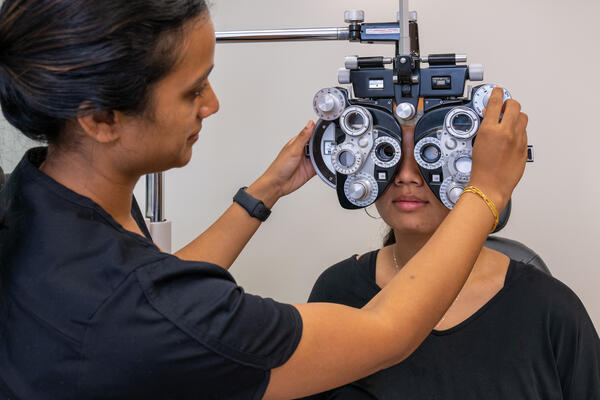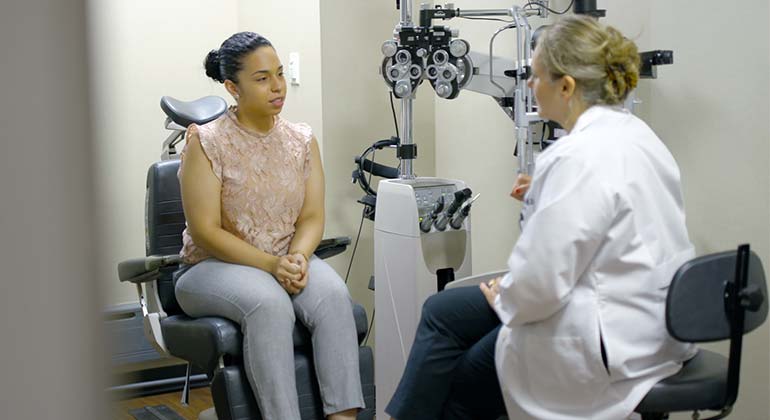Pediatrics in Andalusia: Compassionate Look After Growing Families
Pediatrics in Andalusia: Compassionate Look After Growing Families
Blog Article
Is Refractive Surgical Procedure Right for You? Factors to Think About for Better Eyecare
In the world of eye care, the choice to go through refractive surgery is a weighty one that demands thoughtful consideration. From the complexities of one's ocular health to the ins and outs of daily routines and personal assumptions, each facet holds value in the wider landscape of refractive surgical treatment candidateship.
Eye Health And Wellness Assessment
When thinking about refractive surgery, an extensive eye health and wellness assessment is vital to evaluate the suitability of the procedure for each and every person. eye center andalusia. This assessment entails a series of assessments and examinations performed by an eye care specialist to figure out the overall wellness of the eyes, the visibility of any kind of hidden conditions, and the security of the refractive error
During the evaluation, numerous factors are taken into consideration, such as the patient's case history, present eye prescription, corneal thickness, student size, and tear film high quality. These analyses help to determine any contraindications to refractive surgery, such as corneal abnormalities, cataracts, or unattended eye infections. Additionally, the analysis aids to take care of patient assumptions regarding the possible end results of the surgical treatment based on their one-of-a-kind eye attributes.
Eventually, the eye health and wellness evaluation is important in guaranteeing the safety and security and efficiency of refractive surgical treatment, as it offers important understandings into the individual's eye health and wellness status and aids figure out the most appropriate therapy alternatives for achieving optimum visual results. (neurologist andalusia)
Way Of Life Analysis
A complete way of life evaluation is indispensable in determining the viability of refractive surgery for an individual's visual correction demands. Way of living elements such as occupation, hobbies, and daily activities play a crucial role in the decision-making process pertaining to refractive surgical treatment. Individuals with careers that involve a high degree of physical task or direct exposure to ecological elements may have various aesthetic needs contrasted to those with less active desk tasks. Recognizing just how an individual's way of living may impact their vision post-surgery is crucial for taking care of expectations and guaranteeing optimum end results.
Additionally, lifestyle practices such as sports participation, outdoor tasks, or even skin care routines can influence the recovery process and general success of refractive surgical treatment. By performing a comprehensive lifestyle assessment, eye treatment professionals can customize their referrals and therapy strategies to fulfill the special demands of each person, inevitably leading to boosted aesthetic results and satisfaction.
Expectation Positioning

Individuals need to understand that while several people achieve 20/20 vision or better adhering to refractive surgical treatment, some might still call for glasses for certain activities like analysis or driving at evening. Handling these assumptions aids protect against frustration and discontentment post-surgery, leading to a more favorable total experience for the client.
Risk Evaluation

Variables that might raise the danger of complications include age, certain medical problems like autoimmune illness, unsteady vision prescription, slim corneas, and unrealistic patient assumptions. In addition, choosing a competent and knowledgeable doctor, complying with pre and post-operative care directions faithfully, and divulging any pertinent case history can assist alleviate dangers.
To reduce the probability of issues, ophthalmologists perform complete pre-operative evaluations to determine any type of contraindications to surgical procedure. They also discuss the possible dangers and advantages with individuals throughout the consultation process. By participating in open communication and shared decision-making, both the individual and the eye doctor can interact to figure out if refractive surgical treatment is the right selection based on individual risk profiles and desired results.
Consultation Value
Thinking about the important duty of notified decision-making in evaluating dangers and possible issues in refractive surgery, the appointment process holds substantial importance in assisting people in the direction of optimal results. During the assessment, the eye doctor examines the patient's eye health and wellness, refractive errors, and total viability for surgery. This initial evaluation is critical in figuring out one of the most appropriate procedure for each person, taking into account aspects such as corneal thickness, pupil size, and existing eye problems.
Moreover, the assessment acts Look At This as a chance for individuals to review their expectations, worries, and any questions they might have concerning the surgery. Clear interaction between the individual and the specialist is necessary to make sure realistic assumptions and a detailed understanding of the possible threats and advantages included.
Additionally, the assessment permits the doctor to explain the various medical alternatives offered, their corresponding end results, and the post-operative care required. This detailed discussion empowers clients to make knowledgeable choices about their eye care, bring about far better satisfaction and end results post-surgery.
Final Thought
Finally, individuals thinking about refractive surgical procedure must undertake a comprehensive eye health assessment, assess their way of life habits, align their expectations with potential end results, analyze the associated dangers, and focus on assessments with eye treatment experts. These factors play a vital role in determining the viability of refractive surgery for each and every person, guaranteeing optimal end results and contentment with the procedure.
Clients taking into consideration refractive surgery often have high assumptions relating to the outcomes, expecting perfect vision without the requirement for glasses or contact lenses. While refractive surgical procedure can greatly enhance vision and decrease dependency on visual help, it is essential for people to comprehend that results might vary based on private aspects such as the degree of refractive error, corneal density, and general eye wellness.
By involving in open interaction and shared decision-making, both the patient and the ophthalmologist can work together to establish if refractive surgical procedure is the appropriate choice based on specific danger profiles and wanted outcomes.
Thinking about the vital duty of notified decision-making in evaluating dangers and possible difficulties in refractive surgical treatment, the appointment process holds considerable relevance in guiding patients in the direction of ideal outcomes. During the assessment, the ophthalmologist evaluates the patient's eye wellness, refractive mistakes, and total suitability for surgical procedure.
Report this page